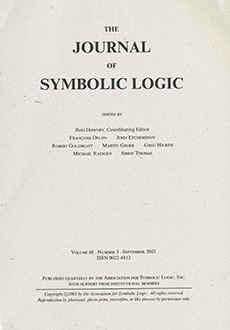Abstract
We call a logic regular for a semantics when the satisfaction predicate for at least one of its nontheorems is closed under double negation. Such intuitionistic theories as second-order Heyting arithmetic HAS and the intuitionistic set theory IZF prove completeness for no regular logics, no matter how simple or complicated. Any extensions of those theories proving completeness for regular logics are classical, i.e., they derive the tertium non datur. When an intuitionistic metatheory features anticlassical principles or recognizes that a logic regular for a semantics is nonclassical, it proves explicitly that the logic is incomplete with respect to that semantics. Logics regular relative to Tarski, Beth and Kripke semantics form a large collection that includes propositional and predicate intuitionistic, intermediate and classical logics. These results are corollaries of a single theorem. A variant of its proof yields a generalization of the Gödel—Kreisel Theorem linking weak completeness for intuitionistic predicate logic to Markov's Principle.
Citation
Charles McCarty. "Completeness and incompleteness for intuitionistic logic." J. Symbolic Logic 73 (4) 1315 - 1327, December 2008. https://doi.org/10.2178/jsl/1230396921
Information





